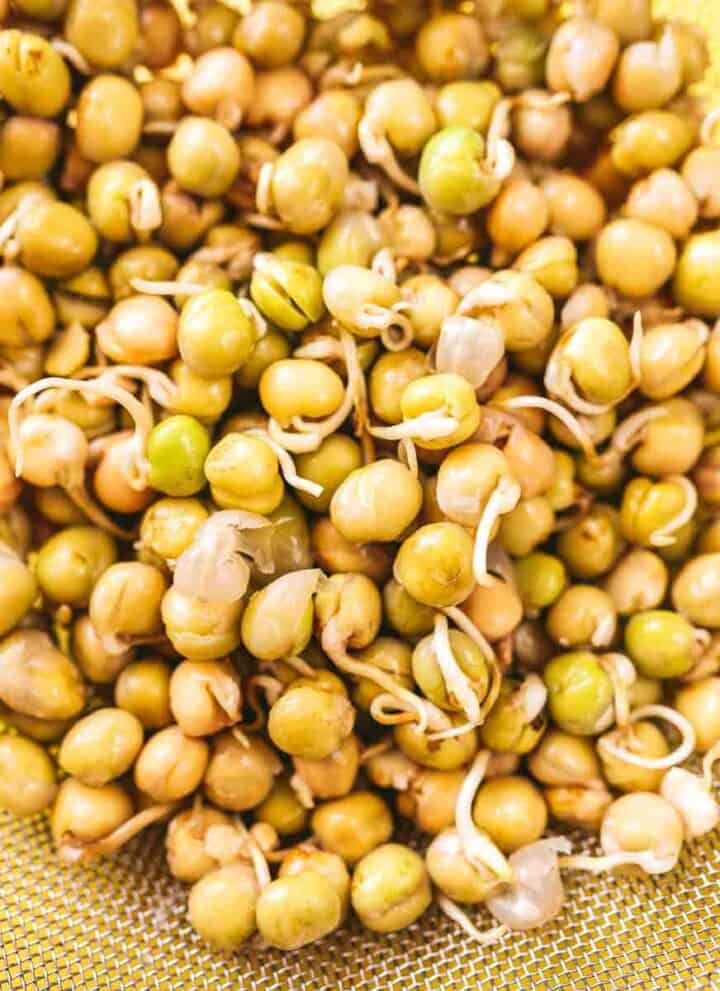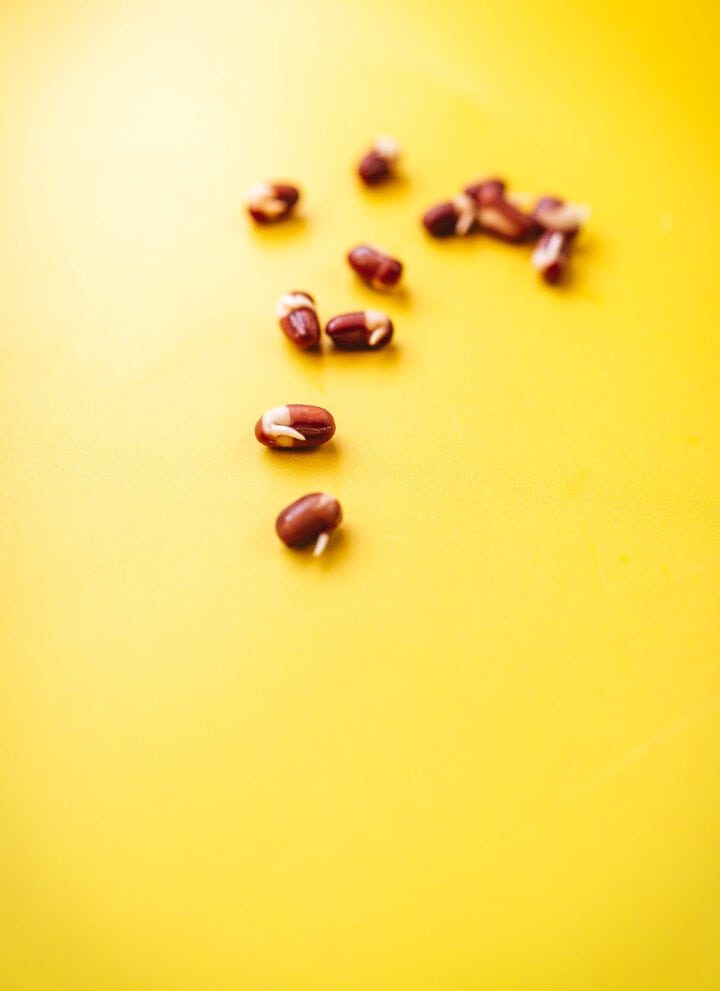Learn how to store sprouts to maintain their freshness and crispness with these helpful tips. Keep your sprouts at their best for longer with proper storage techniques.

Sprouts are a nutritious and delicious addition to salads, sandwiches, soups, and meals. They are easy to grow at home and can be harvested in just a few days. However, storing sprouts can be a challenge, as they are highly perishable and can quickly decay if not stored properly.
Jump to:
Proper storage of sprouts is essential to maintain their freshness, flavor, and nutritional value. The key to storing sprouts is to keep them moist but not wet, and to store them in a cool, dry place. There are several methods for storing sprouts, including refrigeration, freezing, and drying. Each method has its advantages and disadvantages, and the best method depends on the type of sprout and how it will be used.
Key Takeaways
- Proper storage of sprouts is essential to maintain their freshness, flavor, and nutritional value.
- Sprouts can be stored in a variety of ways, including refrigeration, freezing, and drying.
- The best method for storing sprouts depends on the type of sprout and how it will be used.
Why Sprouts Must be Stored Properly
One of the great things about sprouts is that they are packed with immune-boosting vitamins, nutrients, minerals, and antioxidants. In fact, many sprouts are excellent sources of protein and vitamin C, which can help to support a healthy immune system. By storing your sprouts properly, you can ensure that they retain these valuable nutrients and stay fresh for longer.
When it comes to storing sprouts, there are a few things to keep in mind to keep their crunch, ensure they stay fresh, and retain their valuable nutrients. Whether you're dealing with mung bean sprouts, alfalfa sprouts, radish, pea, quinoa, buckwheat, sunflower, or broccoli sprouts, proper storage is key.
First and foremost, it's important to note that raw sprouts are more susceptible to contamination than cooked sprouts. This is because they are often grown in warm, moist conditions that can promote the growth of harmful bacteria. If you're concerned about the safety of your sprouts, consider cooking them before eating.
Assuming you're dealing with fresh, raw sprouts, the best way to store them is to keep them in a sealed container in the refrigerator. This will help to prevent moisture from building up, which can cause the sprouts to spoil quickly. It's also a good idea to rinse the sprouts thoroughly before storing them to remove any dirt or debris.

Proper Storage of Sprouts
When it comes to storing sprouts, the key is to keep them fresh and dry to prevent decay. Here are some tips on how to properly store sprouts:
Prepare Your Sprouts
When it comes to preparing sprouts, soaking them in water is a common practice that can help to remove any dirt or debris. However, it's important to keep in mind that soaking sprouts for too long can actually cause them to start rotting. To avoid this, it's best to soak your sprouts for no more than a few hours at a time and to always give them a final rinse before using them in your recipes.
Another important step in preparing sprouts is to remove any excess moisture before storing them. One way to do this is to use a salad spinner, which can help to remove water quickly and efficiently. Alternatively, you can wrap your sprouts in cheesecloth and gently squeeze out any excess moisture. Once your sprouts are dry, secure them with a rubber band and store them in a sealed container in the refrigerator. Be sure to keep them away from direct sunlight, as this can cause them to spoil quickly.
Storing Fresh Sprouts
To store fresh sprouts, first, remove any excess moisture by gently patting them dry with a paper towel. Then, transfer them to an airtight container or a plastic bag with a few holes poked in it to allow for air circulation. Store the container or bag in the crisper drawer of the refrigerator at a temperature between 34 and 38 degrees Fahrenheit.
It's important to note that sprouts have a relatively short shelf life and should be consumed within a few days of purchase. Therefore, it's best to only purchase the amount of sprouts you plan to use within a few days.
Freezing Sprouts
If you have excess sprouts that you won't be able to consume within a few days, you can freeze them to extend their shelf life. To freeze sprouts, first blanch them by placing them in boiling water for 1-2 minutes, then immediately transferring them to an ice bath to stop the cooking process. Pat them dry, then transfer them to a freezer-safe container or bag and freeze them for up to six months.
When using frozen sprouts, it's best to thaw them in the refrigerator overnight before using them in your desired recipe.
Overall, by properly storing sprouts, you can ensure that they stay fresher for longer and avoid any unnecessary waste.

Frequently Asked Questions
How do you keep sprouts fresh longer?
To keep sprouts fresh longer, it is important to store them properly. After rinsing the sprouts thoroughly with cold water, allow them to drip dry for 8-12 hours. Then, transfer them to a breathable storage container and store the container in the refrigerator at a temperature between 34-38 degrees Fahrenheit. It is also important to remove any excess moisture from the container to prevent the sprouts from getting soggy.
How long can you store sprouts in the fridge?
When stored properly, sprouts can last for up to a week in the refrigerator. However, it is recommended to consume them within a few days of purchase for the best quality and freshness.
How do you know if sprouts have gone bad?
If sprouts have gone bad, they will have a slimy texture and a sour smell. Additionally, there may be discoloration or mold growth on the sprouts. If any of these signs are present, discard the sprouts immediately.
What is the best container to store sprouts in?
The best container to store sprouts in is a breathable container that allows for proper air circulation. A glass jar with a mesh lid or a plastic container with ventilation holes are good options. Avoid storing sprouts in sealed containers or plastic bags, as this can cause excess moisture buildup and lead to spoilage.

Can I keep sprouts in water overnight?
It is not recommended to keep sprouts in water overnight, as this can cause them to become waterlogged and lose their crispness. Instead, rinse the sprouts and allow them to drip dry before storing them in a breathable container in the refrigerator.
Can you eat the hulls of sprouts?
Yes, you can safely eat the hulls of sprouts. The hulls are the outer layer of the seed and are safe to consume. However, some people may find the taste and texture of the hulls to be less appealing.
Can you freeze fresh uncooked sprouts?
Fresh uncooked sprouts can be frozen for later use. To freeze, blanch the sprouts in boiling water for 2-3 minutes, then rinse them in cold water and pat them dry. Place the sprouts in a freezer-safe container or plastic bag and label with the date. Frozen sprouts can last for up to three months in the freezer.


















Jane says
Thanks! I washed the sprouts thoroughly to remove any dirt before storing them in a glass jar with a mesh lid. I ate them a few days after I put them in storage, and it is still fresh.